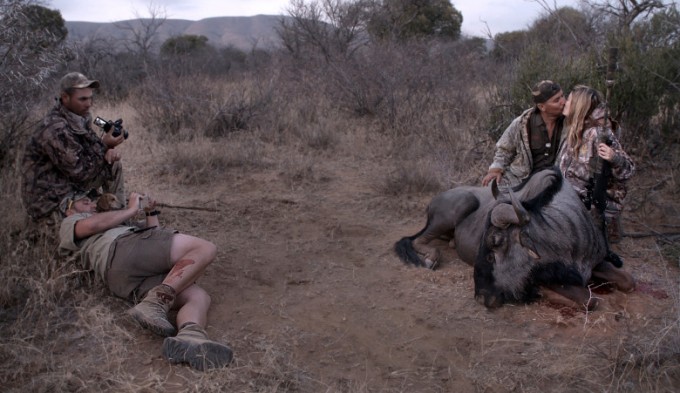
Dir.: Shaul Schwarz, Christina Clusiau; Documentary; Uk/Namibia/South Africa/Zimbabwe/USA 2017, 108 min.
Directors and DoPs Shaul Schwarz and Christina Clusiau (A Year in Space) showcase the inconvenient truth about big game hunting, partly against their own will, in this informative documentary. In filming the Big Game hunters, poachers, ecologists and breeders in action and listening to their comments, they have taken, in my opinion, a shameful stance in siding with the hunters, claiming their slaughtering is all part of ‘conservation’. But images do not lie: Trophy shows the barbarism of hunting, whatever PR comments the human predators make in their defence.
Schwarz and Clusiau (“we had to be open-minded, empathic and curious”) kick off with Philip Glass, a Texan who breeds sheep on his ranch in San Angelo. He is a “believer” and lifelong hunter who travels to Africa to kill the “big Five”: Buffalo, lion, leopard, elephant and rhino. To make sure, this spirit stays in the family and he teaches his son to hunt – something the filmmakers coyly describe as “a rite of passage”.
We then visit Las Vegas for the yearly meeting of The Safari Club International Convention (SCI) in Las Vegas, where around 25,000 people buy their hunting trips. SCI organises the trips, which cost on average between 25,000 and 100,000 USD. At the convention one can also buy guns, safari gear and trophy insurance, making it a one-stop shop for this racket which, according to the filmmakers, “started with a father-son-rite of passage relationship which is now part of a larger cycle.”
The case of John Hume, a South African rhino breeder who owns Buffalo Dream, Ranch, is a little more ambivalent. Hume has around 1500 rhino, whose horns he trims every two years, regularly subjecting the animals under anaesthetic. In 2009 the South African government ordered a rhino horn moratorium which resulted in a sharp rise in poaching. Hume won the case, and is now the proud owner of five tons of horns, which are worth million’s of Dollars and are now for sale in South Africa. Whilst Hume is hardly a philanthropist, he is less heinous than the poachers, who kill the rhinos brutally before selling the horns.
The entire weight of Glass’ bravado and bible-quoting (“Humans should have dominion over animals”), as well as his distain for “people who believe in evolution”, comes down on the filmmakers when they show an elephant crying pitifully for seemingly ages after be he has been shot by Glass. This scene alone contradicts everything Schwarz and Clusiau have to say about Glass and his like. Whilst Schwarz agrees with Clusiau “ I had a hard time with the elephant as well. I had a hard time with controlling what I think about Phil and what I think about people like him”. But in an interview Schwarz repudiates himself: “I don’t think Philip is a bad guy.” Then Schwarz goes on the defensive, stating “that even if Philip is an ass, does this completely kill the discussion how we should think about conservation? And does Philip hunting, because I, as a viewer don’t like him, disqualify his hunting as a form of conservation?” And Clusiau states in the same interview: “I agree with Shaul and don’t think Paul is a bad person. I appreciate that all the characters in the film, fully believe in what they are doing. I may not agree with their methods, but for me it’s more a question to if these methods help conserve”.
The myth about hunting as a form of conservation is best repudiated in Kenya, where the vicious ‘sport’ has been banned. Kenya has the most beautiful parks in Africa and tourism keeps their existence in economical terms, whereas South Africa has gone the opposite way: animals are just a commodity, ready to be sacrificed for private profit. Give Trophy a watch and draw your own conclusions: do you have to be cruel to be kind?. AS